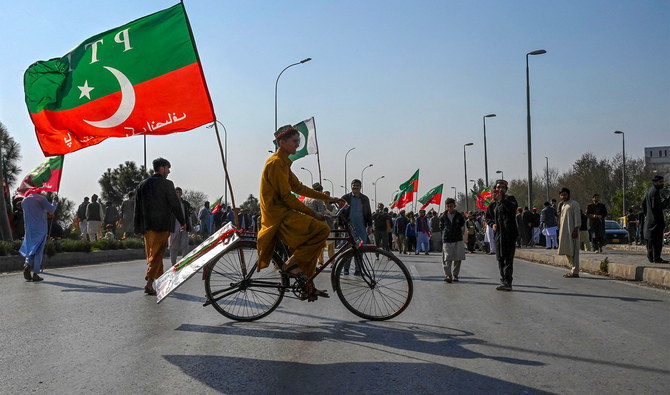ISLAMABAD: Former prime minister Imran Khan’s Pakistan Tehreek-e-Insaf (PTI) party is mulling a merger with the religious party Majlis Wahdat-e-Muslimeen, a senior leader of the PTI confirmed on Sunday, as it eyes reserve seats in parliament to form its government at the center.
Pakistan’s election regulator announced the unofficial results of the 2024 general elections according to which independent candidates, many of whom were affiliated with Khan’s PTI party, secured the highest number of seats, 101.
Last month, Pakistan’s top court upheld a court ruling that stripped the PTI of its electoral symbol, a cricket bat. As a result, Khan’s candidates were forced to contest polls as independent ones. This meant the party would not be entitled to reserve seats for minorities and women in parliament, which helps parties form the federal government.
Along with the 266 directly elected seats, there are also 70 reserved seats — 60 for women and 10 for non-Muslims— allocated based on each party’s strength in the National Assembly, to determine their final standing.
One of the strategies at the PTI’s disposal is to join a smaller party in parliament to form a single bloc to fulfill the requirement for them to be allocated reserve seats, and hence, put up a joint candidate for the post of prime minister.
“Alliance with MWM is definitely an option we are considering seriously,” Khan’s close aide and media adviser, Sayed Zulifkar Bukhari, told Arab News.
The MWM is a Pakistani religious and political organization that advocates for the rights of Shia Muslims in the country. During national polls, the PTI and MWM joined forces to help the MWM candidate win the NA-37 constituency. The MWM has only one seat in the parliament.
Bukhari said the PTI would “definitely” merge with a party.
“We will look into reserve seats as well,” he said. “We also hope to win a majority of our challenged seats where the public’s mandate has been stolen,” Bukhari added.
He said if the PTI is not able to form its government at the center, it would feature in the strongest opposition that Pakistan has ever seen.
“We definitely would not be forming any govt with Pakistan Muslim League-Nawaz (PML-N) or the Pakistan Peoples Party (PPP) as PDM 2 is doomed for failure,” Bukhari said, referring to the Pakistan Democratic Alliance (PDM), a coalition of anti-PTI parties comprising PPP, PML-N and others that challenged Khan’s government.
Husnain Zaidi, an MWM spokesperson, said his party would unconditionally welcome all PTI parliamentarians and facilitate them according to their preferences.
“We have an alliance with them and will not hesitate to demonstrate our platform to them,” Zaidi told Arab News.
He said both parties were in contact with each other over a possible merger, adding that a formal decision on the matter would be reached soon.
“Regarding the reserve seats, the decision will be made by the PTI, and we will cooperate with them accordingly,” he said.
Meanwhile, PML-N leader and former three-time prime minister Nawaz Sharif has invited other political parties in the country, such as the Muttahida Quami Movement Pakistan (MQM-P) and the Pakistan Peoples Party (PPP) to help it form a coalition government at the center.
















